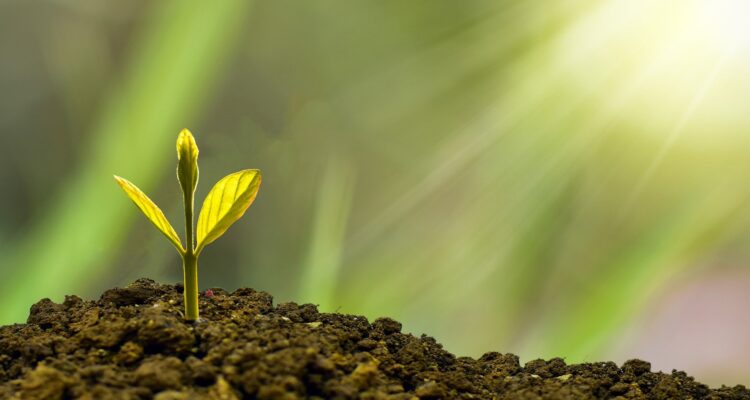An increasing number of conventional farmers in India are incorporating biostimulants in their cultivation regimes.
◊ By Jency Samuel (with inputs from Rutaksha Rawat)
Note: To find organic brands, organic product suppliers, and organic shops in India, buy the Organic Directory
Lesen Sie diesen Artikel auf Deutsch
“In India, there is widespread depletion of soil health due to overuse of fertilisers and chemical inputs. Biostimulants help to rebuild the soil, resulting in better yields,” says Pradeep Jaipuria, Managing Director of Bengaluru-based PJ Margo Private Limited, one of India’s largest producers of humic products from sustainable agri bio inputs.
Indeed, degradation of soil due to the excessive use of chemical fertilisers has left many farmers without an alternative.
And biostimulants are delivering on their promise.
“Since the last 15 years, biostimulants have been consistently showing results and farmers have received good yields, in terms of quality and quantity. Most biostimulants use raw material from organic sources, so they do not damage crops, while conventional chemical fertilisers and growth regulators can damage crops if not used in recommended dosages — which is often the case,” says Manohar Shete, Executive Director of Nashik-based M & M Industries, a major manufacturer and exporter of organic inputs.

“Since the last 15 years, biostimulants have been consistently showing results and farmers have received good yields in terms of quality and quantity. Most biostimulants use raw material from organic sources, so they do not damage crops, while conventional chemical fertilisers and growth regulators can damage crops if not used in recommended dosages — which is often the case.” — Manohar Shete, Executive Director, M & M Industries
The development of the Indian organic market, too, is spurring growth, as more farmers continue to convert to organic — from 835,000 in 2019 to 1,366,226 in 2021.
Moreover, in India, most farmers have small landholdings of less than 2 ha, due to which they are yield-centric. “Farmers expect more yield from less land and biostimulants facilitate this,” says Shete.
POPULAR BIOSTIMULANTS
There are various biostimulants which have taken the centrestage and the main ones contain humic substances, amino acid/protein, seaweed, vitamins, antioxidants and antitranspirants, microbials and bio chemicals.
Biostimulants experiencing the most demand currently are those that promote root growth and increase the size of fruits and vegetables. Biostimulants which prolong the harvesting period are also much in demand, as are those with seaweed.

“In India, there is widespread depletion of soil health due to overuse of fertilisers and chemical inputs. Biostimulants help to rebuild the soil, resulting in better yields.” — Pradeep Jaipuria, MD, PJ Margo Private Limited
BIOSTIMULANTS PERFORMING BETTER THAN BIO PESTICIDES & BIO FERTILISERS
Whereas biostimulants are being adopted by conventional farmers in large numbers, bio pesticides and bio fertilisers have failed to impress them due to their slow results and short shelf life.
“The bio pesticides and bio fertilisers market is not growing as fast as biostimulants because the former are living microorganisms and give slow results. These microorganism products also have a shorter shelf life and need to be stored under specific conditions by dealers or the retail shops where they are stocked. Most sale points lack proper storage facilities. Therefore, due to heat, etc, the product’s lifespan is cut short. Another important factor is that bio pesticides and bio fertilisers are incongruent with other agri input products, whereas farmers seek to reduce costs by mixing two or more different kinds of products together,” Shete explains why bio pesticides and bio fertilisers have failed to cut ice with Indian farmers.
MARKET POTENTIAL
As per a report by market research firm, Knowledge Sourcing Intelligence, the India biostimulants market is projected to expand at a CAGR of 16.49%. The forecast period is for a market size of US$ 180.949 million by 2023, from US$ 71.232 million in 2017.
Industry insiders believe growth would exceed the projections, with a CAGR of 20%, expected to reach US$ 300 million by 2025.
Some, like Sudha Reddy, Managing Director of Hyderabad-based KN Bio Sciences India Pvt Ltd, believe that biostimulants will eventually become as popular as conventional growth promoters — a forecast that may very well come to fruition, with the recent decision of the Indian government to regulate biostimulants under the FCO (Fertiliser Control Order) — which is expected to give a boost to the market.
“In the past, local authorities of various states were not encouraging of biostimulants. On the contrary, they were preventing various companies from selling them in order to deter fly-by-night operators from selling spurious products. This will change once the products are registered under the new FCO regulation,” says Jaipuria, whose company PJ Margo sells 50 kilolitres of humic liquid and 650 metric tonnes of humic granules on an average every month.
Multinational companies and large chemical fertiliser brands have not missed the uptick, having promptly added biostimulants and other bio inputs to their portfolios.
“Since the harmful effects of conventional agri products are becoming increasingly apparent to farmers, more of them are showing interest in biostimulants. Companies dealing in conventional agri inputs have noticed this trend and they’ve also started making these inputs,” says Reddy.
Stakeholders expect the market to grow beyond the shores as well. Chandrakant Sheth, R & D Director of Ahmedabad-based Cippy Bio International, believes the Asia-Pacific market holds promise, since it is estimated to grow at a CAGR of 15.2% over 2021-26 as per market intelligence agency, Mordor Intelligence.
Shete’s M & M Industries, which exports biostimulants and other organic inputs to 24 countries, also anticipates growth across the Middle East and Europe.



Insightful article !